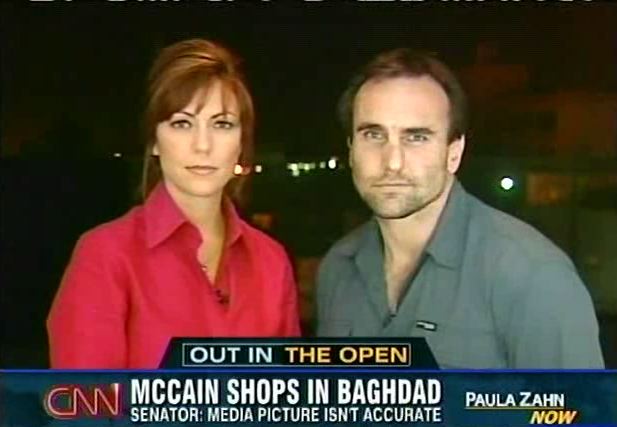PZN: "...the senator disagrees with our assessment of the war."

Click photo to play
Length: 4:30
RICK SANCHEZ: Out in the open right now: a claim that the American people aren't getting the full picture of what U.S. troops are accomplishing in Iraq. Is the news media hiding something? Or is it just presidential politics?
Senator John McCain, who, of course, is running for the presidency, paid a surprise visit to the Baghdad market over the weekend. He wore body armor, but no helmet. Now, even though the market has been the target of repeated bomb attacks, the unannounced and heavily guarded shopping trip went fine, according to reports.
Now, later, McCain accused the news media of not reporting on the improvements in Baghdad under the current troop surge. That prompted some skepticism and even some pushback among the reporters who were there when he made the declarations.
CNN's Kyra Phillips and Michael Ware are in Baghdad. They have been watching this. In fact, they saw the whole thing.
Michael, let's begin with you. So, while Senator McCain is far from calling this a mission accomplished -- to be fair, he didn't say that -- what is going on in Iraq, he did say that he sees some progress. He talked about being able to drive from the airport and go out in the city for the first time.
Most of us stateside listen to this and say, hey, that's great news. That would mean that things are finally turning around.
Question to you: Is it true?
MICHAEL WARE, CNN CORRESPONDENT: Well, no, quite simply put, it's not.
I mean, for Senator McCain, this might be the first time that he's managed to be able to drive from the airport, under heavy guard, and it's the first time that he may have been able to venture out into the city streets.
But I can tell you, for the years that I have been here throughout this war, many American generals have walked those streets, enveloped by heavy security.
SANCHEZ: Is it even possible to go there in just a couple of days and assess the situation, the way that McCain and others have tried to do?
KYRA PHILLIPS, CNN ANCHOR: No way. That's absolutely impossible.
And, just to give you an example, I mean, I spent the day with General David Petraeus, just like Senator John McCain spent a day with Petraeus. And Petraeus and I went into the Dora district. I mean, this is a place that is haunted by a death squad. Al Qaeda cells still operate in that area. And he had inner-, outer-perimeter security. He had helicopters. He had guards everywhere.
And then McCain goes to a -- quote, unquote -- "safer district" -- I mean, I can't even say that anything is really safe around here. He had the same amount of security.
Bottom line, you're with the head of U.S. forces in Iraq, you're going to have an entourage.
SANCHEZ: Makes sense.
Now, yesterday, at the news conference, McCain did face some tough questions. We talked about that a little while ago. It was kind of like a back-and-forth between members of the media, something we see all the time like at the White House, for example.
(BEGIN VIDEO CLIP)
QUESTION: In comments that you made on CNN, you said that General Petraeus wandered around here in an unarmored Humvee, and I would like to bring it back to...
MCCAIN: General Petraeus -- General Petraeus...
(CROSSTALK)
MCCAIN: General Petraeus goes to -- goes downtown almost every day. And, of course, he has protection. And we had protection today.
Things are getting better in Iraq. And I am pleased at the progress that has been made. And I will continue to be pleased with the progress.
(END VIDEO CLIP)
SANCHEZ: While we're watching that news conference, Michael, let me ask you flat out, because you know that there's a report out there that says that, during this news conference, you heckled Senator McCain. What's your response to that?
WARE: No, absolutely not. I did not heckle the senator.
Indeed, I never even made a comment throughout the entire press conference. Indeed, when I finally did raise my hand, the press conference ended abruptly.
And, essentially, the senator disagrees with our assessment of the state of the war.
SANCHEZ: We have got some numbers. You know, a lot of people smarter than us have said that numbers don't lie. So, we are going to share some brand-new numbers with you that we have just received, numbers that seem to say that, since this surge, it looks like this as far as civilian deaths. These are Iraqi civilian deaths that we're talking about.
They have risen, from 1,552 in February, 2007, to 1,939 in March. Now, that's a 25 percent increase. All this is going on during the surge.
Now, it seems to me that that's a problem.
Guys, go ahead.
WARE: Well, this was always anticipated. The surge was never meant to be the answer to all problems. Even the commanders of all of the U.S. forces, the leader of this war, General Petraeus, said, let's be cautious about our expectations here.
What's happened is what's happened every time there's been an offensive in the capital.
SANCHEZ: Michael Ware, Kyra Phillips, thanks so much for the lively exchange. I really enjoyed it. Good job out there.
